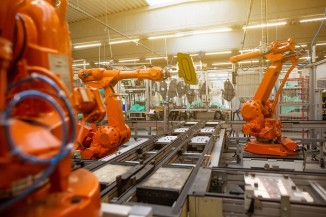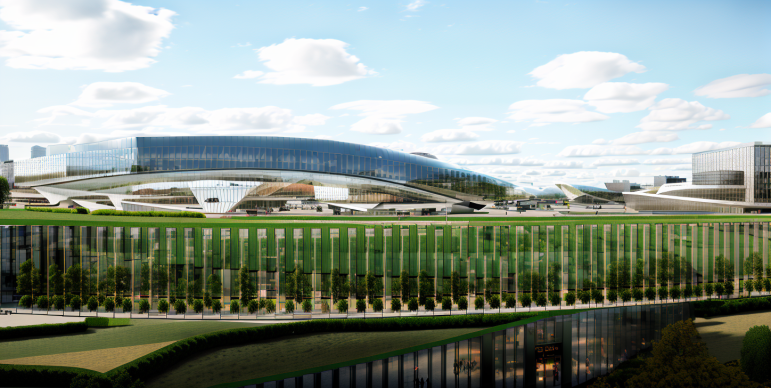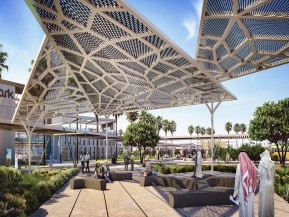
Blog / Disruptive Technologies
5 Innovative AI Strategies Revolutionising the Construction Sector
Categories

The advent of Artificial Intelligence (AI) has indeed rewritten the rules of various industries, and the construction sector is no exception.
This remarkable blend of technology and construction aims to streamline the project life cycle, enhancing efficiency, safety, and productivity.
Here, we dive into some of the revolutionary AI techniques that are completely changing the face of the construction industry.
1. How AI is Streamlining Construction Project Management
Imagine a world where project management isn't fraught with the tightrope act of balancing resources, mitigating risks, and curtailing cost overruns. This dream scenario is fast becoming a reality courtesy of AI, enabling construction project management to emerge as a more streamlined, efficient, and predictable process.
AI algorithms are extremely adept at analysing vast pools of data swiftly, allowing a wealth of actionable insights to be produced. In construction project management, such insights can provide objective perspectives on everything from labour efficiency to cost estimations or even identifying potential delays in advance. This means we are now looking at drastically reduced instances of trial and error in project management, leading to substantial savings in terms of both time and money.
Further, AI comes with the remarkable knack of predictive analysis. How does this benefit construction projects, you might ask? Well, imagine having the ability to foresee potential risks or stumbling blocks way before they become realities. That kind of foresight can be an absolute game-changer, allowing for preventive strategies to be devised and disasters to be averted before they strike.
Consequently, AI not only streamlines the process but also brings a significant increase in the productivity and efficiency of construction project management. This transformation engenders a safer and more productive work environment, leading to better project outcomes overall.
Therefore, whether it's orchestrating resources better, taking on deadline challenges head-on, or minimising human errors, AI is paving a path towards a newer, more efficient era of construction project management.

2. Embracing the Future: AI-Driven Equipment in Construction
Advancements in AI-Powered Machinery
Imagine a robot that could independently navigate a construction site, perform repetitive tasks, and even handle complex and heavy machinery. Sounds like something out of a sci-fi movie, doesn't it? Yet, this is precisely what AI-driven equipment in the construction sector is now capable of doing.
Artificial Intelligence algorithms can predict and pre-empt failures or malfunctions in machinery and equipment, thereby minimising downtime and enhancing project timelines. Machines and equipment infused with AI grow smarter with every use, learning from past experiences, refining performances, and even suggesting more effective ways to accomplish tasks. Driving the future of the construction industry, AI's capabilities are seamlessly blending human abilities with robotics to unveil a fascinating new era of construction.
AI-Enabled Autonomous Vehicles
Let's consider autonomous vehicles, for instance. These self-driving machines—outfitted with powerful AI systems—are designed to perform construction tasks in hazardous settings, thus reducing human exposure to potential risks on the construction site.
The automation they provide isn't just about facilitating mundane or dangerous jobs; it's about precision and efficiency. AI-enhanced autonomous vehicles can precisely dig, drill, and pour concrete—sometimes with more accuracy than their human counterparts. The broad application range of these autonomous vehicles, from excavation to material transportation, is further magnifying the construction industry's efficiency.
The Prospects of AI in Construction Equipment
These advances, however, are just the dawn of what AI could achieve in the construction industry. As we look ahead, AI's influence on construction equipment is expected to grow, heralding a transformative era for the industry. From intelligent drones conducting site surveys to robotic arms constructing complex structures, the potential of AI-driven equipment is indeed revolutionary.
Ultimately, the adoption of AI in construction equipment will not just overhaul traditional construction methods but will provide construction companies a competitive edge, allowing stakeholders to deliver projects on time, within budget, and with a higher level of quality. As we stand on the cusp of this transformation, it's safe to say that the future of the construction industry is not just promising—it's exciting!

3. Revamping Safety Standards: AI’s Role in Construction Sites
Artificial Intelligence is revolutionising the way we approach safety in the construction industry. It's not just about eliminating risks but predicting and preventing them before they have the chance to jeopardise hard work or, more importantly, human lives.
Real-Time Safety Alerts and Monitoring
One of AI's principal roles in construction safety lies in real-time monitoring. Through computer vision and advanced sensor technologies, AI systems can automatically track workers, machinery and even the general state of the work environment. Subtle changes that might escape the human eye can be swiftly spotted by AI, and immediate alerts can be sent out if a potential hazard is detected. This level of contact vigilance can prevent accidents before they occur.
Spotting Safety Trends via Historical Data Analysis
A historical perspective is necessary for thorough safety management. This is where AI's data analytics prowess comes into play. AI algorithms can scan through years of incident reports and safety data, identifying patterns and trends that help predict and prevent future occurrences of similar incidents. Predictive analytics powered by AI can reportedly reduce construction accidents by up to 20%, a significant margin when it comes to the well-being of construction site employees.
Nurturing AI-Enabled Safety Specialists
AI is not just a tool, it’s an essential partner that's shaping new roles within the construction industry. The surge of AI technologies has given rise to positions such as AI Construction Analysts and AI Safety Managers. These professionals work closely with AI systems, leveraging them to improve construction safety while also refining the AI itself with real-world insights and feedback. These roles didn’t exist before, but they are quickly becoming vital components of a modern construction team aimed at safety and efficiency.
Preventative Measures through AI
AI’s capability extends beyond purely reactive roles, it also provides foresight. Using predictive models based on historical data, AI can anticipate accidents or health risks and suggest preventative action. In essence, AI provides a roadmap to navigate potential pitfalls and prevent adverse outcomes. This proactive approach revolutionises construction processes, making them more efficient, cost-effective, and ultimately safer.
4. The Role of AI in Sustainable and Eco-Friendly Construction
Imagine a world where construction processes go hand in hand with environmental conservation. Sounds like a dream, doesn't it? Well, this is no longer just a figment of the imagination but is becoming a reality thanks to Artificial Intelligence. AI not only promotes sustainability in construction but does so without sacrificing efficiency and cost-effectiveness. Let's take a deeper look at how AI is playing its role in creating eco-friendly construction strategies.
Energy Efficiency and Cost Reduction
Artificial Intelligence has shown immense potential in enhancing energy efficiency in construction. How? It's all about smart Resource Management. AI-based systems are proficient in operating HVAC (Heating, Ventilating, and Air Conditioning) and lighting systems according to the real-time needs of a construction project. AI algorithms powered by machine learning adapt and adjust these systems to increase energy efficiency, consequently reducing costs and conserving the environment.
Evaluating Environmental Impact
But there's more. AI takes sustainable construction a notch higher by carrying out exhaustive evaluative processes. It assesses the environmental impact of a project, which allows the stakeholders to make informed decisions aimed at reducing the ecological footprint of their construction activities. This means less harm to the environment and more compliance with green building codes and standards.
Integrating AI into Construction Industry
Indeed, the integration of Artificial Intelligence into the construction industry promises a more sustainable future. From planning to execution, AI can revolutionise the construction process, rendering it more streamlined and environmentally friendly. The upcoming trend of sustainable construction supported by AI shows a promising future where construction and sustainability work synergistically.
Using AI, we're not only building structures, we're crafting the future- a sustainable future. And you are a part of this incredible journey. So, next time you hear "AI in construction", think green!
5. Transforming Labour Productivity with AI in Construction
Imagine a day where construction workers are interacting with AI-powered tools that can predict and prevent on-site accidents, perform complex calculations in real time, and even manage materials and labour resources. That's not a distant future - it's happening now. Robust AI systems integrated into construction operations are redefining labour productivity and paving the way for an innovative future in the industry.
Enhancing On-Site Efficiency Through AI-Powered Tools
The integration of AI-powered tools on construction sites has emerged as a game-changing pathway to optimise resource allocation and job site productivity. Providing instant access to real-time data, these smart tools can analyse workload, track performance metrics, and allocate tasks more efficiently. The result is fewer errors, less wasted materials, and increased productivity.
Delivering Accurate Labor Data Analysis
One of the most transformative capacities of AI in construction is its potential to analyse labour data and optimise team performance. Intelligent analytics systems can monitor worker efficiency, identify persistent bottlenecks, and pinpoint areas for improvement. Furthermore, through predictive analytics, AI systems can anticipate future hurdles and help managers take preemptive action for smoother project execution.
Automating Repetitive Tasks
AI’s ability to automate repetitive and time-consuming tasks is a godsend for the construction industry. AI-powered applications can complete tasks such as scheduling, measurement, estimation, and invoicing, which often consume a significant chunk of a worker’s time. With these tasks automated, workers can focus on more critical, problem-solving aspects of their roles.
Facilitating Enhanced Decision Making
Augmented reality (AR) and virtual reality (VR), two emerging facets of AI, provide visual tools that can influence decision-making processes on-site. From 3D visualisation of projects to simulating construction scenarios in VR, these tools allow construction personnel to plan more effectively and make well-informed decisions that improve overall productivity.
Driving Workforce Training and Development
AI technologies are also playing a key role in training areas that are usually challenging to manage, such as safety training. AI-powered training tools can offer personalised learning experiences, simulate real-life scenarios, and provide immediate feedback, enhancing knowledge retention and accelerating the training process.
In conclusion, AI has a vast potential in transforming labour productivity in the construction sector. From enhancing on-site efficiency to automating repetitive tasks and facilitating enhanced decision making, AI is indeed revolutionising the construction industry at a significant pace.
Bridging the Gap: A Postgraduate Programme in AI for the Construction Industry
There’s no denying it; AI is transforming the construction sector, as we've explored throughout this article. For those eager to ride the wave of this revolution, a tailored postgraduate program focusing on AI applied to construction could be an excellent stepping stone. Let's delve a little deeper into this.
The Need for Specialised Education in AI for Construction
The widespread adoption of AI in the construction sector raises a pressing need - the industry needs professionals who not only understand AI but also how it can be effectively applied to construction. Postgraduate programs addressing this specific educational need provide a unique opportunity to harness AI's potential for transforming the construction industry.
Graduates of an artificial intelligence in construction programme stand at the forefront of a new era in construction. Armed with deep knowledge and experience, they are poised to lead industry transformation, innovating construction practices for the better. Postgraduate education in AI for construction indeed bridges the gap between cutting-edge technology and practical industry applications, fostering a new generation of AI-driven construction leaders.



